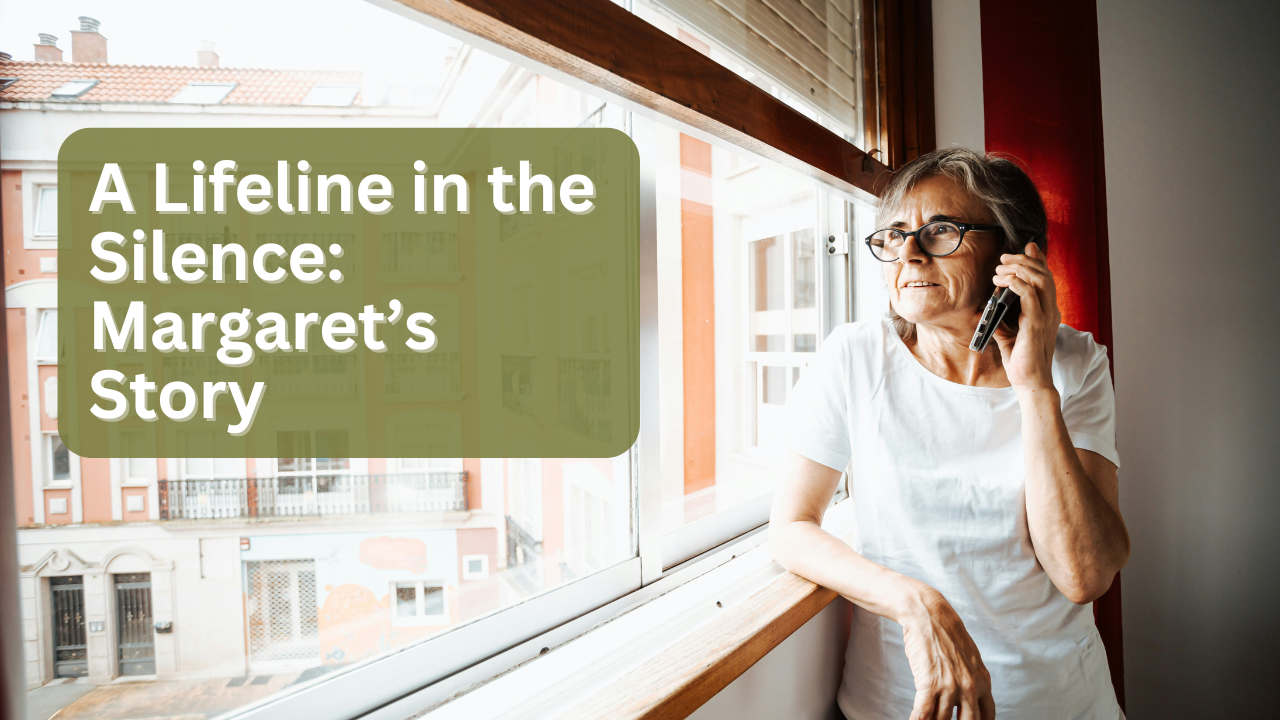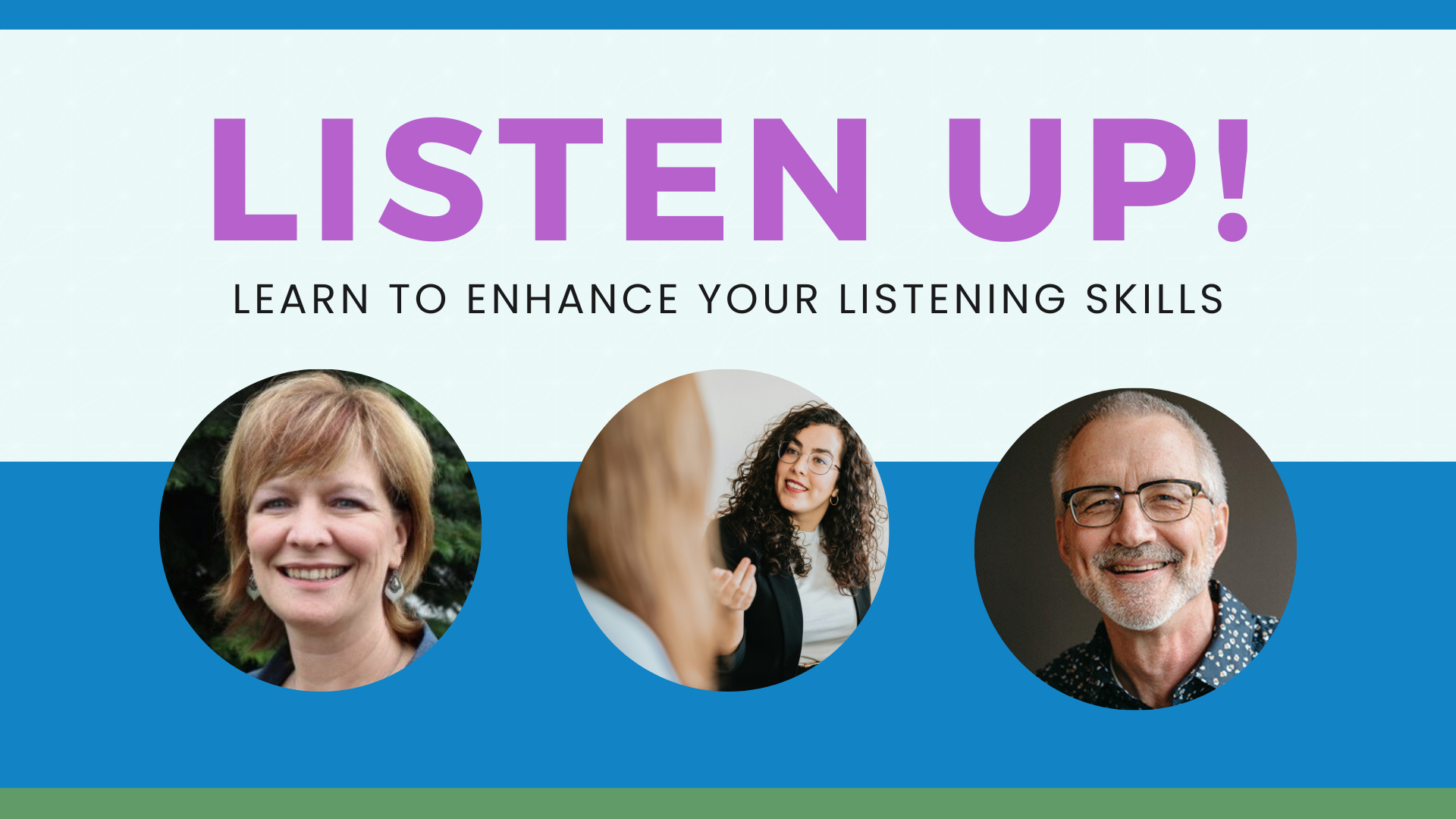PHONE FOR SUPPORT: 1-888-852-9099, 9 AM TO 9:00 PM, 7 DAYS A WEEK
LIVE CHAT: FRIDAYS AND SATURDAYS, 5 PM - 11 PM
The Power of Active Listening in Caregiving: Transforming Connections and Improving Care

Whether you’re working in hospice care, addiction recovery, elder care, social work, or any other caregiving role, active listening is one of the most important skills you can develop. Why? Because listening isn’t just about hearing words—it’s about understanding, connecting, and responding in ways that genuinely support the people in your care.
In this blog, we’ll explore how improving your listening skills can make a massive difference in your caregiving role and introduce you to our “Listen Up!” workshop, a fantastic opportunity to enhance your ability to listen, connect, and make a lasting impact.
What is Active Listening?
Active listening is more than just nodding along when someone speaks. It’s an intentional effort to not only hear what someone is saying but to fully understand and engage with them. This type of listening involves paying attention to both verbal and non-verbal cues, asking thoughtful questions, and responding with empathy and clarity.
In caregiving roles, active listening can transform your relationships with patients, clients, and even colleagues. It helps create an atmosphere of trust, openness, and compassion, which can lead to better care, improved problem-solving, and fewer mistakes. But let’s break it down further into why active listening matters so much.
Why Active Listening Matters in Caregiving
As a caregiver, you’re in a unique position to make a profound difference in someone’s life. Whether it’s helping a patient navigate their health journey or providing emotional support to someone in recovery, your role is essential. However, the effectiveness of your care often hinges on your ability to listen actively.

Here are a few key reasons why listening is so important in caregiving:
1. Building Trust and Connection
People in care settings often feel vulnerable. Whether due to illness, age, or life circumstances, they may feel like their voices are not always heard. Active listening lets them know you care about what they’re saying. When you give someone your full attention, you build trust and foster a deeper connection, helping them feel safe and understood.
2. Gaining Valuable Information
Often, patients and clients will reveal crucial information when they feel heard. Through active listening, you may catch subtle cues about their needs, feelings, or concerns that they might not explicitly state. This information can help you tailor your care to better serve them, improving outcomes and making your job easier in the long run.
3. Preventing Mistakes
Poor communication is a leading cause of errors in caregiving. Misunderstandings, missed cues, and incomplete information can result in mistakes that affect patient safety. By honing your active listening skills, you reduce the likelihood of these errors, ensuring that you provide the best care possible.
4. Strengthening Professional Relationships
Listening isn’t just important for patients; it also plays a huge role in your relationships with colleagues and supervisors. Whether you’re collaborating on a care plan or resolving workplace conflicts, active listening helps ensure everyone is on the same page. This not only makes your job more enjoyable but also enhances your professional reputation.
5. Reducing Stress for You and Your Clients
Active listening can also make your job less stressful. When people feel listened to, they’re less likely to be frustrated or upset. This makes interactions smoother and more positive. Plus, knowing that you’re truly understanding your clients’ needs can give you peace of mind, helping to reduce the stress that comes with caregiving.
Barriers to Effective Listening in Caregiving
While the benefits of active listening are clear, we all know that caregiving environments can be chaotic and demanding. Between time pressures, stress, and distractions, it’s easy for good listening habits to slip.
Some common barriers include:
- Distractions and Interruptions
Healthcare settings, in particular, are full of distractions. Alarms, beepers, and even your own to-do list can pull your attention away from the person you’re talking to.
- Emotional Stress
Caregiving can be emotionally exhausting. When you’re tired, overwhelmed, or stressed, it’s harder to focus on someone else’s needs and feelings.
- Cultural and Language Differences
Sometimes, communication barriers can arise from differences in language, culture, or even personality. These can make it harder to fully understand what someone is trying to express.
- Judgments and Biases
We all have our own perspectives, and sometimes these can prevent us from really listening to someone else’s experience or point of view.
Overcoming these barriers takes practice, but the good news is that active listening is a skill you can improve with the right strategies.

Strategies for Improving Your Active Listening Skills
So how can you become a better listener? Here are some practical tips:
1. Be Present
When you’re interacting with someone, focus entirely on them. Put aside distractions and try to engage with the person in front of you. This means making eye contact, nodding, and giving verbal affirmations like “I see” or “Go on.”
2. Ask Open-Ended Questions
Encourage the speaker to share more by asking questions that can’t be answered with a simple “yes” or “no.” This shows you’re interested and gives them the chance to open up.
3. Use Reflective Statements
Paraphrasing what someone has said can help you clarify their message and show that you’re listening. For example, “So what I’m hearing is that you’re feeling frustrated because…”
4. Stay Patient and Avoid Interrupting
It can be tempting to jump in with your thoughts or advice, especially when you think you know the solution. But interrupting can make the speaker feel unheard. Take a step back, listen to their entire message, and respond thoughtfully.
5. Practice Empathy
Empathy is key to active listening. Try to put yourself in the speaker’s shoes and understand things from their perspective. This not only helps you listen better but also builds a deeper connection.
Want to improve your listening skills? Attend the
Listen Up! Workshop
If you’re ready to take your listening skills to the next level, the *Listen Up!* workshop is the perfect opportunity. Designed for individuals in caregiving roles, this workshop will help you develop the skills you need to become a better listener—and by extension, a better caregiver.
Here’s what you can expect:
- Interactive Discussions and Activities
You won’t just sit and listen; you’ll engage in role plays, discussions, and activities that challenge you to think about listening in new ways.
- Expert Facilitators
Our facilitators, Wendy Toews and Bill Strom, are experienced professionals who understand the importance of listening in caregiving. They’ll provide you with practical tools and techniques that you can start using right away.
- Connect with Like-Minded Professionals
You’ll have the chance to connect with others in your field, share experiences, and learn from each other.
Listening is Key to Better Care
Active listening is one of the most powerful tools you can have as a caregiver. By improving your listening skills, you can build stronger relationships, provide better care, and make a lasting impact on the lives of those you serve.
Ready to enhance your skills? Join us for the upcoming
Listen Up! workshop and take the first step towards becoming a more compassionate and effective caregiver.
_ _ _
Article Sources:
Can Better Listening Skills Make You a Better Caregiver?
Active listening: The key of successful communication in hospital managers
How can you improve your active listening skills in healthcare?
All photos care from Unsplash
Need Someone to Listen?
Remember, you're not alone on this journey. If you're seeking a compassionate ear and a heart that understands, we encourage you to call us. Support is just a phone call away. See below for information on how to connect with us.
Discover Hope in Every Email
Join our community for uplifting stories, expert advice, and a path to healing.
Get the support you need
For Crisis or Emotional Support Call:
- 604-852-9099 in Abbotsford and Mission
- 1-888-852-9099 toll free throughout British Columbia
- If you are in a life threatening crisis, please call 911
Recent Posts
> End your Anxiety: A Prayerful Approach
> Renew your Strength – God's Promise to You
> Bible Verses that Help When You're Afraid | Telecare











